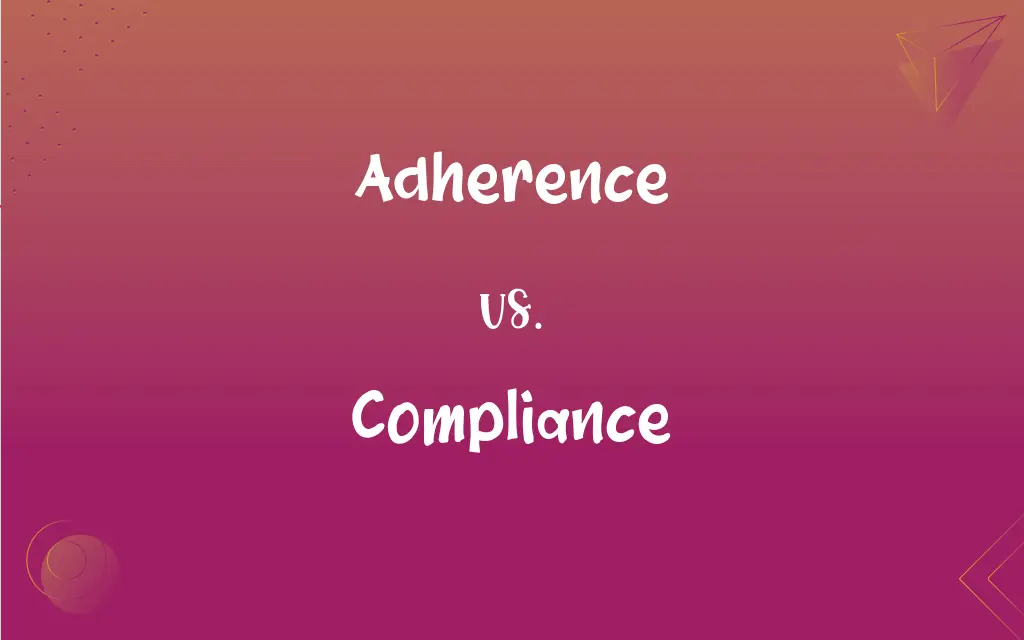Adherence vs. Compliance: What's the Difference?
Edited by Janet White || By Harlon Moss || Updated on October 30, 2023
Adherence refers to the act of sticking to or following closely; compliance denotes conforming to a rule, standard, or request.

Key Differences
Adherence and compliance are terms often used interchangeably, but they carry subtle differences in meaning. Adherence conveys a sense of dedication or attachment to a particular belief, course of action, or set of guidelines. It emphasizes an active and persistent commitment. On the other hand, compliance is more passive, indicating a response to a directive or standard, often to avoid negative consequences.
In the medical context, adherence implies patients actively following prescribed treatment plans, indicating their commitment and understanding. Compliance, in the same context, suggests patients are merely acting in accordance with doctor's orders, possibly without understanding or full agreement. The distinction highlights the difference between active engagement and passive obedience.
Another example can be seen in the realm of regulations. A company showing adherence to environmental standards indicates a proactive stance, perhaps even going beyond the required minimums. In contrast, a company in compliance with environmental standards might only be doing the bare minimum to avoid penalties, suggesting a reactive approach.
In the realm of personal beliefs, adherence to a philosophy or ideology denotes a deep-seated conviction, where one aligns closely with the principles and tenets. Compliance, when used in this context, might hint at someone conforming to a belief system due to external pressures, perhaps without wholehearted agreement or understanding.
In essence, while both adherence and compliance indicate a form of alignment or agreement, adherence suggests a proactive and committed stance, and compliance hints at a more passive or reactive position.
ADVERTISEMENT
Comparison Chart
Nature
Active and committed
Passive and reactive
In Medical Context
Patient's understanding and following of treatment
Patient following doctor's orders
In Regulatory Context
Possibly exceeding required standards
Meeting the minimum required standards
Relation to Beliefs
Deep-seated conviction
Conforming possibly due to external pressures
Implication
Indicates enthusiasm and agreement
Indicates following rules to avoid negative consequences
ADVERTISEMENT
Adherence and Compliance Definitions
Adherence
Loyalty or commitment to a cause or belief.
Her adherence to the movement never wavered.
Compliance
Observance of official requirements.
The company is under scrutiny for compliance with safety regulations.
Adherence
The quality of staying attached.
The adherence of the label depends on the adhesive used.
Compliance
Meeting the standards set by rules.
Building in compliance with codes ensures safety.
Adherence
The act of sticking closely to.
His adherence to the rules was commendable.
Compliance
The act of conforming or yielding.
His compliance with the law kept him out of trouble.
Adherence
Consistent support for an idea or group.
Members showed strong adherence to the club's principles.
Compliance
Acquiescence or submission.
The captured spy showed no sign of compliance.
Adherence
Following a particular practice or method.
The chef's adherence to traditional recipes made his dishes authentic.
Compliance
A tendency to agree with others.
Her compliance made her an easy target for persuasion.
FAQs
Is adherence always a positive trait?
Contextually, adherence is positive when aligned with beneficial principles but can be negative if adhering to harmful beliefs.
In regulatory contexts, which term implies a proactive approach?
Adherence suggests a proactive stance, often exceeding requirements.
Which term indicates just meeting the minimum requirements?
Compliance often indicates meeting just the minimum standards.
Which term suggests deeper conviction?
Adherence implies a deeper, often enthusiastic, conviction.
Can a product be in compliance with industry standards?
Yes, products can be designed to meet or be in compliance with specific industry standards.
Is adherence subjective?
Adherence can be subjective, reflecting personal beliefs or feelings of loyalty.
Can a company show adherence to ethical practices?
Yes, a company can actively support and follow ethical practices, showing adherence.
Can you be in compliance without adherence?
Yes, one can passively conform (compliance) without actively committing (adherence).
If someone adheres to a diet, what does it mean?
It means they are actively and consistently following the diet's guidelines.
In medical terms, which is more patient-centered?
Adherence is more patient-centered, indicating their understanding and commitment to treatment.
Do adherence and compliance mean the same thing?
While similar, adherence implies active commitment, while compliance suggests passive conformity.
In terms of agreement, which term is more passive?
Compliance is more passive, often indicating conformity to avoid negative outcomes.
Which term is used more in legal contexts?
Compliance is commonly used in legal and regulatory contexts.
Which term reflects a person's internal motivation?
Adherence reflects internal motivation and personal commitment.
Can a person be penalized for non-compliance?
Yes, non-compliance with rules or laws can lead to penalties.
Does adherence always require understanding?
Typically, adherence implies a level of understanding and active commitment.
Is it better for a company to show compliance or adherence to regulations?
Ideally, companies should show both; adherence indicates a proactive stance, while compliance ensures they meet minimum standards.
Can adherence be involuntary?
Adherence usually suggests voluntary commitment, while compliance can be involuntary.
Is compliance only about following rules?
While often about rules, compliance can also reflect a passive agreement or acquiescence to situations or requests.
Can a patient show both adherence and compliance?
Yes, a patient can actively understand (adherence) and follow a treatment plan (compliance).
About Author
Written by
Harlon MossHarlon is a seasoned quality moderator and accomplished content writer for Difference Wiki. An alumnus of the prestigious University of California, he earned his degree in Computer Science. Leveraging his academic background, Harlon brings a meticulous and informed perspective to his work, ensuring content accuracy and excellence.
Edited by
Janet WhiteJanet White has been an esteemed writer and blogger for Difference Wiki. Holding a Master's degree in Science and Medical Journalism from the prestigious Boston University, she has consistently demonstrated her expertise and passion for her field. When she's not immersed in her work, Janet relishes her time exercising, delving into a good book, and cherishing moments with friends and family.































































